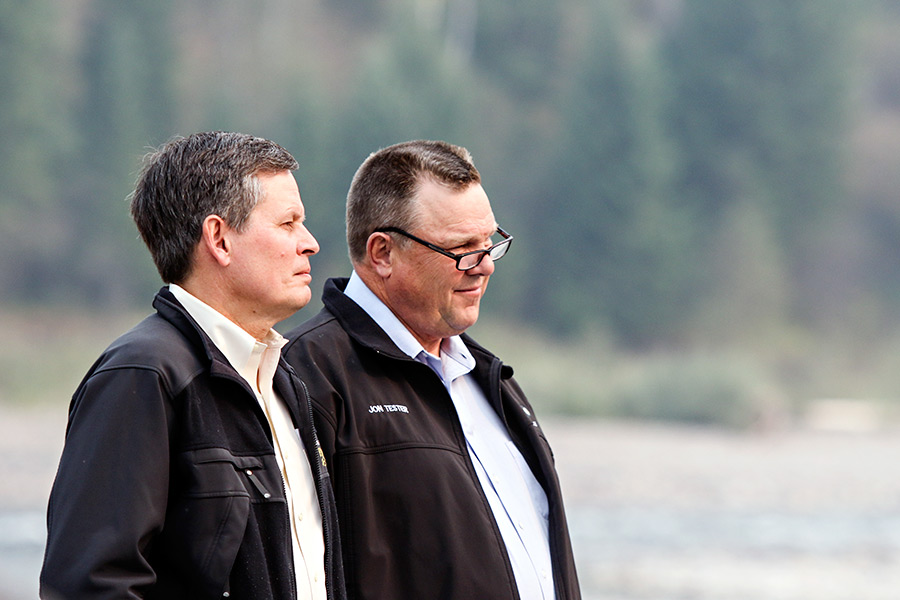On the eve of the deadline to pass one of Montana’s most instrumental funding measures for public lands, U.S. Sens. Jon Tester and Steve Daines reinvigorated their efforts to drum up support for the half-century old Land and Water Conservation Fund (LWCF), calling it a vital funding mechanism for the nation’s open spaces.
Despite the rally cries, and for the first time in its 50-year history, LWCF expired at midnight on Sept. 30, hours after the U.S. Senate failed in its last-ditch effort to keep the measure alive for 60 days, which would have allowed time for lawmakers to craft a long-term plan to permanently reauthorize it. The defeat underscored a streak of dysfunction and disagreement plaguing Congress, and staggered a bill that enjoyed broad bipartisan support.
While the failure to pass LWCF dealt a significant blow to the program’s future, both Tester and Daines pledged to continue to work to permanently reauthorize and fully fund LWCF. However, the bill’s demise is “no doubt a dark day for Montana’s sportsmen and women and outdoor economy,” Tester’s office said in a statement Wednesday night.
“Congress has dropped the ball,” Tester, a Democrat and Montana’s senior senator, said, placing the blame squarely on the shoulders of a hard-right faction of Republicans as well as a majority leadership he accused of doing too little to sway the defectors.
“We’re going to fight to get this thing not only reauthorized but fully funded. But it was not a priority to leadership,” he continued. “There are some folks in the world who don’t see the role of government the way I see it. This is totally on those people who control the House and Senate.”
The LWCF works by collecting royalties from federal off-shore oil leases and makes the money available for matching grants to buy fish and wildlife habitat and increase access for recreation like hunting and fishing. Since its inception, the fund has provided $16 billion for conservation projects, including about $500 million in Montana.
Conservative Republicans who oppose the LWCF do so on principle, saying it expands the federal government’s ownership of land. Tester called that notion ridiculous and pointed to the scores of jobs the program creates through outdoor recreation, an industry that contributes $6 billion annually to Montana’s economy.
Daines, a Republican, co-signed a measure to permanently reauthorize the program, and on Wednesday led a group of Republican senators who testified on the Senate floor, urging their colleagues to reauthorize the measure and touting its role in maintaining public lands and protecting access.
Daines said he was pleased with the Senate’s ability to pass a stopgap measure that staved off the government’s shutdown, but he expressed disappointment that the bill omitted funding for LWCF.
“I will continue pressing my colleagues to permanently reauthorize LWCF,” Daines said.
Painting a grim picture of Congress and its constant partisan gridlock, Tester said he was prepared to “raise some heck” and play strong-arm politics with the Republican holdouts.
“The truth is if people are going to cut the legs out from under a program that really helps drive Montana’s economy, then we are going to have to do stuff like hold bills and make life miserable for them,” he said. “I’m telling you, I’m not going to let a bunch of jobs leave Montana without folks hearing me.”
Conservationist Land Tawney, president of Backcountry Hunters and Anglers, said LWCF pays for everything from large conservation acquisitions to smaller parks and fishing sites easily accessed by city dwellers.
“Access is the number one issue that’s been facing hunters and anglers and has been for a while,” he said. “Over half the people hunt and fish in Montana and more and more folks are moving here to enjoy our great state every year. If the Land and Water Conservation Fund goes away, we lose the number one tool to address diminishing access.”
In the Flathead Valley, the evidence of LWCF is untold.
The Rails-to-Trails bike and pedestrian path that stretches from Somers to Kalispell to Kila was funded in part by LWCF funds, as was Kalispell’s Lawrence Park. It has also helped secure approximately 70 percent of the fishing access sites in Montana while securing land in the Swan Valley for hunting.
Tester said he won’t give up on reauthorization, but said the job just became a lot more difficult, and the recent resignation of House Speaker John Boehner under pressure from conservative Republicans does not bode well for a functioning Congress.
“While averting a government shutdown for now is no doubt a good thing, it took a looming deadline and the resignation of the speaker of the House to get us here,” Tester said. “Make no mistake about it, Congress has an addiction to crisis. They create these problems by waiting until the very last minute and then playing politics instead of completing the most basic part of their job, running the government.”
With LWCF expired, Tester said reauthorization is an uphill battle, but he’ll continue to look for other bills to attach it to as a rider. Still, he was not optimistic.
“The chances to get it back are not as good. Once the program goes away it is a whole different fight,” he said.
